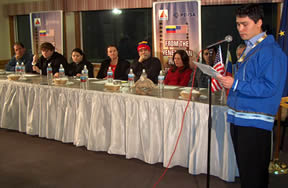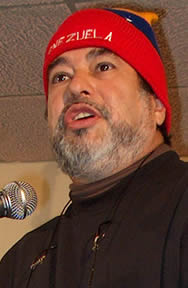
 |

|
Venezuelans get warm welcome in Kotzebue, AlaskaFree Fuel a Big Hit In the BushDecember 18th, 2006First published in The Arctic Sounder  Kotzebue resident Ian Erlich, co-chair of the Alaska Inter-Tribal Council, speaks at a signing ceremony with Venezuelan guests on Thursday, Nov. 30, 2006 , in Kotzebue . The event kicked off of a $5 million oil distribution program, sponsored by the Venezuela-owned Citgo oil company, for rural Alaska villages. Venezuelan visitors behind Erlich (l to r) are: Citgo executive Andres Rangel; the son of Ambassador to the United States, Bernardo Alvarez Jr.; the ambassador's daughter, Ana Elisa Alvarez; the ambassador's wife, Margaret Alvarez; Citgo CEO Felix Rodriguez; his wife, Lesbie Rodiguez; and Citgo execs Gustavo Cardenas and (partially hidden) Rafael Gomez. Photo by John Creed. Scores of local residents squeezed into the local Nullagvik Hotel's modest dining room on the morning of Nov. 30 to meet the visiting Venezuelans, who included Felix Rodriguez, president and CEO of Texas-based Citgo Petroleum Corp., and the wife and children of Bernardo Alvarez, Venezuela's ambassador to the United States. "I'd like to thank the Venezuelan people for helping the people in all of Alaska," said Willie Goodwin, a Kotzebue elder and master of ceremonies during what promoters dubbed a "low-cost heating oil signing ceremony" recognizing Citgo, Venezuela, and its head of state.  Texas-based Citgo oil company President and Chief Executive Officer Felix Rodriguez speaks during a signing ceremony Nov. 30 in Kotzebue. Photo by John Creed. Oil giant Citgo is owned by Petroleos de Venezuela, a state-owned company. The heating oil program, promoted by Venezuelan President Hugo Chavez, this winter is doling out some $5 million worth of free fuel oil, or about 1.2 million gallons. That's 100 gallons each to some 12,000 homes in more than 150 rural Alaska communities with a population of at least 80 percent Alaska Native, according to company officials. Venezuela is an overwhelmingly Catholic, Spanish-speaking country located in the northern portion of South America. Venezuela gained independence from Spain in 1821. Venezuela's national sport is an American game: baseball. Venezuela's indigenous tribes constitute only about 1.5 percent of the country's 25 million people, or exactly the same proportion of Native Americans among the 300 million people in the United States, according to U.S. Census figures. Alaska Natives-Indians, Eskimos and Aleuts-constitute about 18 percent of approximately 660,000 Alaska residents. In recent years constitutional reforms under Chavez, who himself claims indigenous heritage, were designed to elevate indigenous peoples in Venezuela. "The Natives need to go to other countries worldwide for solidarity," said Citgo CEO Rodriguez, explaining that Venezuela's constitution directs his nation to create bonds with other indigenous peoples worldwide. "You (Alaska Natives) are very important in the world," said Rodriguez. Although the donated heating oil goes to rural Alaska villages with at least an 80 percent Native population, the program includes all households in these villages, regardless of race. "Every household, whether it's a Native or non-Native household, is going to receive the hundred gallons," said Barbara Janitscheck, a vice president at Kotzebue-based Maniilaq Association, which is one of 12 Native non-profits coordinating Citgo's oil program in Alaska's Native villages statewide. "Somehow the word got out there that this is a Native-only program, but it's not," said Janitscheck, whose organization is compiling a voucher system in the 12 Northwest Alaska villages that Maniilaq serves in order to divide up 17,590 gallons of heating fuel allocated to the Kotzebue region. Rural Alaska leaders traveling to Kotzebue included: Jeff Vance of Bristol Bay Native Association (Dillingham); Mark Springer and Bill Kristovich of Yukon Kuskokwim Health Association (Bethel); Anita Bailor, Kodiak Area Native Association (Kodiak Island); Gil Gutierrez, Copper River Native Association (Southcentral Alaska); Bill Martin, Central Council of Tlingit Haida (Southeast Alaska); and Herman Kignak of Arctic Slope Native Association (Barrow). In a separate project, this winter Citgo is also partnering with Massachusetts-based Citizens Energy Corp. to bring heating fuel to income-eligible Alaskans at a 40 percent discount, said Citizens Energy spokesman Brian O'Connor, in addition to the donated oil. Program, Presidents CriticizedVenezuela's oil donation and discount programs have not enjoyed universal praise in the United States, primarily because Venezuela's controversial president, the firebrand Chavez, has picked up many detractors among Americans, including some in rural Alaska, for his ferocious attacks on President George W. Bush. For example, in September after Chavez announced his Alaska oil program, four Western Alaska villages-Nelson Lagoon, Atka, St. Paul and St. George-rejected the free oil, offended that Chavez disparaged Bush before the United Nations General Assembly in New York the day after Bush had spoken there. Chavez's attacks have included calling Bush "the devil." Back in Kotzebue, noting reports on CNN predicting that Chavez was poised to win another six-year term in Venezuela in early December, John Schaeffer, vice president of a local elders' council, took a jab at Bush while thanking the Venezuela delegation. "Our president will not be with us for very much longer, so we don't expect him to give us any (oil)," said Schaeffer. In Venezuela's national election on Dec. 3, Chavez crushed his opponent to win another six-year term and further consolidate power in his own country while extending anti-U.S. influence throughout that part of the world. In Kotzebue on Nov. 30, a late-November snowstorm roared just outside the local hotel, reducing this treeless coastal town, which sticks out into the sea atop a narrow gravel spit, to near white-out conditions. Schaeffer told the Venezuelan visitors, whose own country's equatorial climate contrasts sharply with northern Alaska's, that ferocious arctic blizzards don't faze local folks much. "We see a storm like this and we are happy," said Schaeffer. "We're more worried about global warming than cold weather and storms because (they're) what we're used to." Rural Alaska may have never before received so much attention from a foreign head of state, but Alaska Natives in the international spotlight have drawn some searing negatives. After news stories appeared in September on a conservative, Lower 48-based website about Chavez's Alaska plans, visitors to the site excoriated Chavez while supporting village leaders who rejected Venezuela's donated oil. Individuals and businesses in Alaska and the Lower 48 have pledged replacement funds to buy oil for the protesting villages that rejected the free oil. In Kotzebue, however, no Chavez critics were evident on Nov. 30, when speaker after speaker praised him, Citgo and Venezuela for donating heating fuel to society's less advantaged in rural Alaska. "Some people scoff at this great gift and have said that this heating fuel is simply a ploy to undermine the Bush administration, to make it look bad," said Kotzebue resident Ian Erlich, co-chair of the Alaska Inter-Tribal Council. "I disagree. I think that is too simplistic. We should be willing to give credit where credit is due." Last September Chavez flew Erlich and other Alaskans to New York to meet with the Venezuelan president and others as Chavez announced an expansion of his oil program. "Where are the oil executives in Alaska? Where are the politicians?" Erlich asked in September in New York, referring to rural residents forced to pay such high prices to heat their homes in oil-rich Alaska. The High Price of OilIn Kotzebue, a hub community of about 3,000 residents, 100 gallons of delivered oil costs about $418, including 6 percent local sales tax. That's $3.94 a gallon, but those high prices sound like a bargain to villagers in the much smaller and even more remote communities surrounding Kotzebue. "When I purchased a (55-gallon) barrel of oil last, it was $404 and some change," said Lena Downey, who lives in Ambler, located 138 air miles northeast of Kotzebue on the Kobuk River. That's a whopping $7.35 a gallon, or $735 for 100 gallons of heating fuel that, in cold weather, might last 10 days to two weeks to heat a modest home. On Oct. 26 Kotzebue High School student Selma Foster conducted a survey of gasoline prices in Kotzebue and surrounding villages for an essay in an writing class she's taking at the University of Alaska's Chukchi College in Kotzebue. "The subsistence way of life becomes more difficult for Alaska Natives when hunting and fishing for food because of high gas prices," wrote Foster, who found Kotzebue's gas prices averaging $5.03 a gallon; Selawik $5.06; Noorvik $5.34; Kivalina $4.75; Deering $3.80; Kiana $5.33; Buckland $4.18; Noatak $6.59; Kobuk $6.50. Ambler also has high gas prices at $7.85, according to Foster, but she found the region's highest gas prices in Shungnak, where a fill-up hovers at $7.95 a gallon. Alaskans can access the Low-Income Home Energy Assistance Program, but this needs-based federal program has been funded at the very same level for some 20 years. Earlier this year, then-Gov. Frank H. Murkowski had asked the Republican-led state legislature for $8.8 million to help low-income Alaskans cope with high fuel prices. Lawmakers refused. "Tribes in Alaska and their members have a hard time influencing state government," said Erlich. "Being on the receiving end can lead to becoming a giver," he added. "Perhaps someday we too will have resources to help ourselves and to offer help to those in need, even if all they can do for us is graciously accept it and maybe learn from our example. I think that is the lesson we will learn from cheerfully accepting this gift from Citgo and Hugo Chavez." Related Story:  Susan B. Andrews and John Creed are humanities professors at the University of Alaska's branch campus in Kotzebue, located 26 miles above the Arctic Circle in Northwest Alaska. Susan Andrews is a former news director and evening news co-anchor at KTVF-Channel 11 in Fairbanks, John Creed a former reporter for the Fairbanks Daily News-Miner. Their latest book, "Authentic Alaska II: Voices of the Far North," is due for release in 2007. |
Related Story:
|